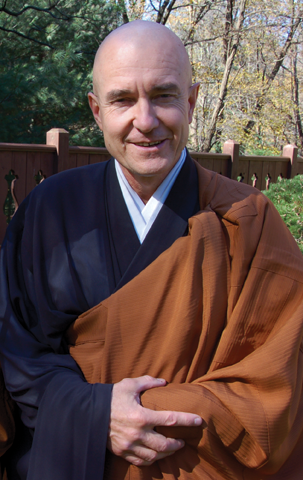 Left: Former Abbot Konrad Ryushin Marchaj in 2012. Photo by Dharma Communications, via Wikipedia.
Left: Former Abbot Konrad Ryushin Marchaj in 2012. Photo by Dharma Communications, via Wikipedia.
The abbot of the Zen Mountain Monastery in the Mount Tremper has stepped down from his post as the leader of the popular Ulster County religious center because of an extramarital affair and his “consuming involvement in shamanic traditions."
Former abbot Konrad Ryushin Marchaj explained his actions in a public statement posted on the monastery’s website on Monday, Jan. 26.
“Over the last six months, I formed an intimate relationship with someone outside our sangha, betraying Hojin Osho [Jody Hojin Kimmel, his wife], not being honest and forthright with her, and breaking our spiritual union vows and ending our marriage," he wrote. “This also violates my monastic vow of stability, and goes against the ethical guidelines that are to be observed by a teacher in our Order.”
Ryushin, as he is known in the community, or sangha, is a 61-year-old former pediatrician and psychiatrist who became the abbot of the Zen Mountain Monastery in 2009 after the death of its beloved founder, John Daido Loori. The monastery was founded in Mount Tremper in 1980 and houses monks, hosts retreats and is home to a wide variety of community and arts activities.
In his statement, Ryushin also said that his recent practice of “shamanic traditions and religions” was “irresponsible.”
A representative answering the phone at the monastery said that no more information about Ryushin’s shamanic practices is available at this time.
The former abbot will take a six-leave of absence from the monastery. Geoffrey Shugen Arnold, the head of the monastery’s Mountains and Rivers Order and its downstate outpost, the Zen Center of New York City, will be Ryushin’s replacement.
In his own statement on the website, Shugen wrote that he asked Ryushin to leave.
“Ryushin’s infidelity – his betrayal of Hojin, his intimate partner, and thus his marriage and monastic vows – is a most serious breach for a person in a position of spiritual and ethical authority and leadership,” Shugan said. “I also feel that his consuming involvement in shamanic traditions, and how this has influenced his recent teachings and behavior has led to confusion and disruption within the sangha.”
The monastery community gathered over the weekend of Jan. 23 through 25 to discuss the scandal and the leadership transition. Audio of a question-and-answer session about the transition has been posted on the monastery’s website.
The sangha's response to the revelations about its leader has been "overall supportive and basically understanding," Shugen said in an interview on Wednesday, Jan. 28.
"We will absorb these changes," he said. "We will work through and heal from them. We’ll do what we do."
Shugen said that taking responsibility for moral failings is one of the monastery's teachings.
"We have vows to uphold moral precepts, and to take responsibility, individually and collectively, when that’s not happening," he said. "What we’re doing is what we would ask our students to do."
Correction: The Zen Mountain Monastery was founded in 1980, not 1985, as a previous version of this article stated. The monastery was known by a different name between 1980 and 1985.










